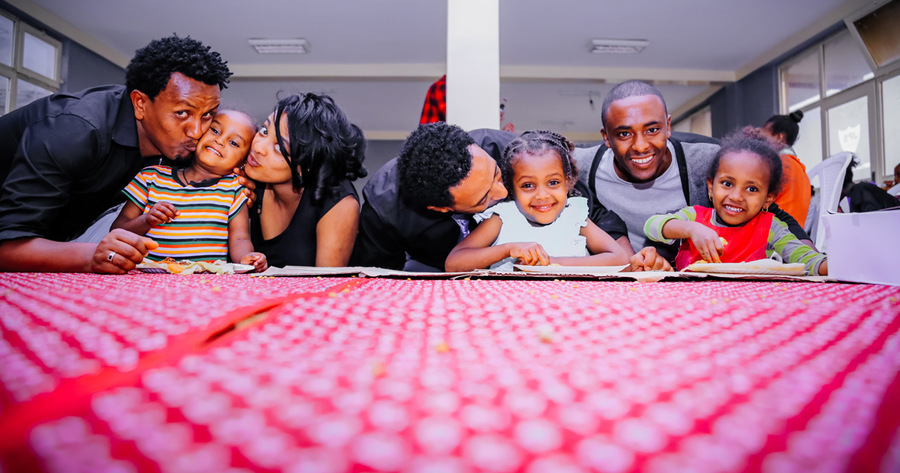Both are a follow-up to the adult version and to my children's book There's Greatness on the Inside, The ABC's of Life for Kids is meant to empower young people to conceive, believe and achieve.
Ultimately, the best way to ensure that kids can define, work toward and accomplish their goals is through strong guidance from parents, guardians and educators.
So, let's talk about the A, B and C of family engagement.
ACCOUNTABILITY is key, for children and adults.
Holding kids accountable seems obvious and simple, but let's admit it: We've all had times when we were tempted to protect our kids from the consequences of their actions. To arrive at the point of accountability (for failure or success), we have to allow children the freedom to make choices for themselves.
It can be frightening to give a child the power to make a decision that could result in defeat, but it's necessary. Every child is faced with decisions throughout life when they're not being monitored or guided by an adult. One important way young people learn the importance of well-thought-out decisions is by being exposed to negative consequences.
Of course, positive reinforcement is equally important. Acknowledge and reward good choices and actions as appropriate!
As adults, accountability is an aspect of modeling appropriate behavior. Children look to the adults in their life for examples of how to behave, especially in difficult situations. The goal is to help your child clearly understand expectations for their actions and reactions; feel empowered to make choices; and think about how their behavior impacts others. That means, even if you do exhibit poor behavior or decision-making, it can be a learning experience for your child. Acknowledge and discuss what you could have done differently, and accept the consequences gracefully.
BOOKS can be better together!
Our ultimate goal should be encouraging a genuine interest in independent reading, and a love of books almost always starts with hearing them read aloud.
Enjoying books and attaining reading proficiency can change everything for a child. Through my initiative, Read2BGreat, I encourage parents and teachers to encourage 20 minutes of reading a day, every day. For young children, and older children still working on proficiency, these 20 minutes should be replaced or supplemented with listening to books read aloud. In fact, studies show that children listen at a higher level than they read until grade eight.
Reading a book with your child creates an environment that allows for additional context for new words, discussion of important themes, and exercises that develop critical thinking skills. Hearing new words used in full sentences helps children with pronunciation and intonation. Just as important as the educational benefits, reading aloud with your child also reinforces the parent-child relationship.
CONVERSATION, with and about your child.
As a parent, it's your responsibility to know what's going on in your child's life. This has to start with having open discussions with them.
Ask open-ended questions, and pay attention. Too often, we're distracted by life and accept one-word answers and vague descriptions as good enough. For young children, it can take some time for them to fully articulate thoughts. Don't interrupt—listening and encouraging more details builds self-confidence and sets a precedent for interactions as they get older. It's normal for teenagers to be less enthusiastic about talking to their parents. Be prepared to share your own experiences to encourage discussion, keep conversation calm and focused whenever possible, and allow them time to talk.
Whenever appropriate, keep your child informed of conversations you're having with other adults about them. This particularly applies to parent-teacher conferences and discussions with parents of their friends or peers. The result? Your child knows you're getting feedback from other adults, but that you also respect them and welcome their voice in the conversation.
Don't forget to dream! Talk to your children about what they want to accomplish, and help them turn dreams into short- and long-term goals. Even the wildest dreams start with small steps, and it's up to you work with your child to build a path to success. Set attainable benchmarks, and talk about how everyday choices help us get closer to achieving a goal. Whenever possible, turn failures into teachable moments on hard work and perseverance.
Keep in mind: family engagement empowers a child to identify and become their best self. Always give your child time, beyond A to Z, to reassess the big picture and find the greatness on the inside!
 Byron Garrett is chairman of the National Family Engagement Alliance (NFEA), a nonprofit organization dedicated to transforming education through meaningful family engagement. Byron is a keynote speaker for NAA18. Learn more about him on our keynote page.
Byron Garrett is chairman of the National Family Engagement Alliance (NFEA), a nonprofit organization dedicated to transforming education through meaningful family engagement. Byron is a keynote speaker for NAA18. Learn more about him on our keynote page.




